- Home
- Kristin Harmel
The Sweetness of Forgetting Page 26
The Sweetness of Forgetting Read online
Page 26
It’s a few minutes past six when we pull off the highway in Pembroke. We find Elida’s house easily enough, thanks to the directions she gave us. It’s a blue, white-shuttered, two-story home in a small, well-kept neighborhood just behind a Catholic church. Annie and I exchange looks, get out of the car, and ring the doorbell.
The woman who opens the door and introduces herself as Elida is older than I’d expected; she looks like she’s in her midforties. Her skin is pale, and she has thick, black hair that tumbles down her back, nearly to her waist. I’ve never met anyone from Albania, but she looks like what I’d expect someone from Greece or Italy to look like.
“Welcome to our home,” she says, shaking my hand first, and then Annie’s. Her eyes are deep and brown, and her smile is kind. “It is just my grandmother and me here tonight. My husband, Will, is working. Please, come in.”
I hand her the box of miniature Star Pies I’ve brought for dessert, and after she thanks me, we follow her inside, down a hallway lined with black-and-white photographs of people I assume are her family members. She tells us that in Albania, the main meal of the day is lunch, but that tonight, they’ve made a special dinner. “I hope you like fish,” she says, turning around slightly. “I have prepared an old family recipe that my grandmother used to make in Albania.”
“Sure,” I say, and Annie nods. “You didn’t have to go to so much effort, though.”
“It is our pleasure,” she says. “You are our guests.”
We turn the corner into a dimly lit dining room, where at the head of the table sits a woman who looks far older than Mamie. Her face is heavily lined, and her snow-white hair has fallen out in places, leaving her with a strangely patchy head of receding hair. She’s wearing a black sweater and a long, gray skirt, and she stares at us with bright eyes from behind enormous tortoiseshell glasses that look far too big for her face. She says something in a language I don’t recognize.
“This is my grandmother, Nadire Veseli,” Elida tells Annie and me. “She speaks only Albanian. She says she is glad you have come and that you are very welcome in our home.”
“Thank you,” I reply.
Annie and I sit beside each other to the right of the old woman, and Elida returns a moment later with four bowls on a tray. She sets one down in front of each of us and takes her own seat on her grandmother’s left side.
“Potato and cabbage soup,” Elida says, nodding at the bowls. She picks up her spoon and winks at Annie. “Do not worry. It’s more delicious than it sounds. I lived in Albania until I was twenty-five, and this was my favorite food when I was your age.”
Annie smiles and takes a sip of her soup, and I do the same. Elida’s right; it’s very good. I can’t put a finger on the spices in it, but it tastes hearty and fresh.
“It’s real good,” Annie says.
“I love it,” I agree. “You’ll have to give me the recipe.”
“With pleasure,” Elida says. Her grandmother says something softly in Albanian and Elida nods. “My grandmother would like to hear the story of how your grandmother was saved, please,” Elida translates for us. Her grandmother nods and looks at me hopefully. She says something else to Elida, who again translates for us. “My grandmother says she hopes she is not being rude in asking.”
“Not at all,” I murmur, although I’m still confused about what we’re doing here. But for the next twenty minutes, Annie and I explain what we’ve learned recently about Mamie’s past and how she escaped Paris. As Elida translates our words into Albanian, her grandmother listens, staring at us intently and nodding. Her eyes begin to fill with tears, and at one point, she interrupts Elida loudly and says several sentences in Albanian.
“She says to tell you that your grandmother’s story is like a gift to her,” Elida says. “And that she is happy you have come to our home. She says it is good that young people like you and your daughter are reminded of the concept of oneness.”
“Oneness?” Annie asks.
Elida turns to my daughter and nods. “We are Muslims, Annie, but we believe you are our sister, although you are Christian and come from a Jewish background. I married a Christian man from a Jewish background because I love him. Love can transcend religion. Did you know that? In the world today, there is too much division, but God made us all, did he not?”
Annie nods and looks at me; I know she’s not sure how to respond. “Yeah, I guess,” she finally says.
“It’s why I took a job with the Abrahamic Association,” Elida explains. “So that I could work to foster understanding between religions. In the years since World War Two, it seems that much of the brotherhood we once shared has vanished.”
“But what does that have to do with us?” I ask softly.
Elida’s grandmother says something and Elida nods, then turns back to me. “Your call for help came to me,” she says. “In our culture, that means I now have the obligation to assist you. It is a code of honor called Besa.”
“Besa?” I repeat.
Elida nods. “It is an Albanian concept that derives from the Koran. It means that if someone comes to you in need, you must not turn them away. It is because of Besa that my grandmother and I have asked you here tonight. It is because of Besa that my grandmother and her friends and neighbors saved many Jews, at the risk of their own lives. And it is likely because of Besa that your grandmother was saved too, even if the Muslims in Paris did not call the concept by the same name as we do in Albania. And now, my grandmother would like to tell you her story.”
Elida’s grandmother smiles at us in silence as Elida rises to clear our soup dishes. Annie offers to help, and a moment later, the two of them return with plates full of fish and vegetables.
“This is trout baked with olive oil and garlic,” Elida explains as she and Annie sit down. “It is a common dish in Albania. There are also baked leeks and Albanian potato salad. My grandmother and I wanted you to have a taste of our homeland.”
“Thank you,” Annie and I say in unison.
“Ju lutem,” Elida’s grandmother says. “You are welcome,” she adds in English.
Elida smiles. “She knows a few words of English.” She pauses as her grandmother says something else. “And now, she would like to tell you about the Jews she sheltered in our hometown of Kruje.”
Elida’s grandmother begins to tell us, with Elida translating, that she was a newlywed when the war began and that her husband was a very well-known, well-liked man in their small town, where everyone knew everyone else.
“In 1939, the Italians occupied our country, and then in September 1943, the Germans came,” Elida translates as her grandmother speaks. “Right away, it became clear they were hunting the Jews who lived among Albanians, my grandmother says. Albania, you see, had become a refuge of sorts for Jews fleeing from Macedonia and Kosovo, and from as far away as Germany and Poland.
“In 1943, several Jewish families came to our small town of Kruje, seeking refuge,” Elida continues as her grandmother tells her tale in her native language. “My grandfather was one of the townspeople who offered to take in refugees. The family who came to stay with them, my grandmother says, were the Berensteins, from Mati, Germany. She can still remember them.”
Elida pauses then, and her grandmother says in slow, careful English, “Ezra Berenstein, the father. Bracha Berenstein, the mother. Two girls. Sandra Bernstein. Ayala Berenstein.”
Elida nods. “Yes. The Berensteins. The girls were very young, just four and six. The family had fled at the start of the war and had been gradually making their way south, in hiding.”
Elida’s grandmother begins to speak again, and Elida resumes her translation. “My grandmother says that she and her husband were poor, and provisions were very low because of the war, but they welcomed the Berensteins into their home. The whole town knew of it, but when the Germans came, no one betrayed them. Once, the Germans came to the house, and Mr. and Mrs. Berenstein hid in the attic, while my grandmother and grandfather pretended Sandra and Aya
la were their own children, Muslim children. After that, they dressed all the Berensteins in peasant clothing, and my grandfather went with them and helped them move into the mountains nearby, to a smaller village. After a time, my grandmother followed. They lived there with the Berensteins, helping to protect them, until 1944, when the Berensteins again began to move south, toward Greece.”
I realize there are tears in my eyes as I listen to the story. I glance at Annie and see that she looks equally moved.
“What happened to them?” I ask. “The Berensteins? Did they make it out safely?”
“For a very long time, my grandmother did not know,” Elida says. “She and my grandfather prayed for them every day. After the Germans were defeated in late 1944 in Albania, the country was taken over by Communists, and Albanians were not allowed to communicate with the outside world. It was 1952 when my grandparents received a letter from the Berensteins. They were alive, all four, and living in Israel. They thanked my grandparents for what they had done, for extending Besa, and Ezra Berenstein wrote that he had sworn an oath to repay my grandmother and grandfather, should they ever need help. My grandparents were not allowed to respond, and they feared the Berensteins would think they had died, or worse, that they would think they had not remembered them.”
Elida’s grandmother says something else and Elida smiles and replies to her in Albanian. She turns back to Annie and me. “I told my grandmother I know the rest of the story, and so I can tell you,” she says. “I was twenty-five when Communism fell in 1992, and our country was once again open to the world. But Communism had destroyed us, you see. We were very poor. There was no future for us in Albania, but there was no money to leave. I lived with my grandmother and my parents. My grandfather had died years before. One day, there was a knock at our door.”
“Was it Ezra Berenstein?” Annie interrupts eagerly.
“No, but you are close,” Elida replies with a smile. “Mr. Berenstein had died some years before, as had his wife. But the daughters, Sandra and Ayala, had never forgotten their time in my grandparents’ home. They were in their fifties by then, and they had been working to get my grandparents declared Righteous Among the Nations, which is a title given to those people who helped save Jews at the peril of their own lives. Now they were at our door, nearly fifty years after they first came to Albania for shelter, wishing to repay what my grandmother and grandfather had given to them.
“My grandmother explained to them that Besa isn’t to be repaid,” Elida continues. “Not on this earth, anyhow. She told them that it was her duty to help them, her duty to God and to her fellow man, and that she was very glad they had lived and gone on to happy lives. Ayala lived in America by then, and she had married a very wealthy man, a doctor named William. She had converted to Christianity, and they’d had two sons, she told my grandmother. She said she owed my grandmother everything, because without their help, she and her family would never have survived. She told my grandmother that she wanted to help us get out of Albania and bring us to America. And a year later, after securing visas for us, that is exactly what she did. My parents decided to remain in Albania, but my grandmother and I moved here, to Boston, to begin a new life.”
“Do you still see Ayala and her family?” Annie asks.
Elida smiles. “Every day. You see, I married Ayala’s oldest son, Will. And now, our families are one forever.”
“That’s incredible,” I breathe. I smile at Elida’s grandmother, who blinks a few times and smiles back. I think about how many lives she changed when she and her husband made the decision to shelter a Jewish family, despite the fact that they could have lost their lives because of it. “Thank you so much for telling us your story.”
“Oh, but the story is not finished,” Elida says. She smiles, reaches into her pocket, and withdraws a folded piece of paper, which she hands to me.
“What is this?” I ask as I begin to unfold it.
“It is Besa,” she says. “You are looking for Jacob Levy, and your request came to me. My husband, Will, the son of Ayala, who my grandmother saved nearly seventy years ago, is a police officer. I asked him to do this favor, and he found your Jacob Levy, born in Paris, France, on Christmas Day 1924.” She nods at the piece of paper in my hand. “That is his address. As of a year ago, he was living in New York City.”
“Wait,” Annie interrupts. She grabs the piece of paper from me and stares at it. “You found Jacob Levy? My grandmother’s Jacob Levy?”
Elida smiles. “I believe so. His information matches the details your mother provided.” She turns to me. “Now you must go find him.”
“How can we ever thank you?” I ask, my voice trembling.
“There is no need to,” Elida says. “Besa is our honor. Just promise us that you won’t forget what you learned here today.”
“Never,” Annie says right away. She hands the piece of paper back to me, and her eyes are wide as saucers. “Thank you, Mrs. White. We’ll never, ever forget. I promise.”
Chapter Twenty-two
Cinnamon Almond Cookies
INGREDIENTS
2 sticks unsalted butter
1 1/2 cups packed brown sugar
2 large eggs
1 tsp. almond extract
2 1/2 cups flour
1 tsp. baking soda
1 tsp. salt
1 cup cinnamon sugar (3/4 cup granulated sugar mixed with 1/4 cup cinnamon)
DIRECTIONS
1. In a large bowl, beat the butter and brown sugar until smooth. Add the eggs and almond extract and beat until well combined.
2. Sift together the flour, baking soda, and salt, and add to the butter mixture, approximately 1/2 cup at a time, beating after each addition, until well combined.
3. Divide the dough into 5 parts and roll into logs, wrap each in plastic wrap, and freeze until firm.
4. Preheat oven to 350 degrees.
5. Spread cinnamon sugar in a shallow dish. Unwrap logs and roll them in the sugar until liberally coated.
6. Slice the logs 1/4-inch thick and place slices on greased baking sheets. Bake for 18–20 minutes.
7. Cool for 5 minutes on baking sheet, then transfer to racks to cool.
Rose
Once, very long ago, when Rose was four years old, her parents had taken her, along with her sister Helene, to Aubergenville, not far from Paris, for a week in the countryside. Her mother was very pregnant that summer of 1929; Claude would be born just six weeks later. But for those glimmering summer moments in the sun, it was just Rose and Helene, four and five years old, the objects of their parents’ attention and affection.
Helene had been charged with watching her younger sister, while her parents sipped white wine on the back deck of the small home they were renting from friends for a week. They were not watching when Helene took Rose around the corner of the house, to the little creek that babbled by.
“Let us go in the water,” Helene said, taking her sister by the hand. Rose hesitated. Maman and Papa would be angry, she thought. But Helene insisted, reminding Rose of the stories their mother read them at bedtime about the family of ducks who lived along the banks of the Seine. “The ducks go swimming all the time, and it is fine,” Helene told her. “Do not be such a baby, Rose.”
And so Rose followed her sister into the water. But the calm surface was deceptive; there was a current running underneath, and as soon as Rose stepped in, she felt it sucking at her toes, pulling her under, taking her away. She did not know how to swim. She was suddenly underwater, thrust into another world, where there was no air, almost no sound. She tried to scream, but the water only filled her lungs. It was dark beneath the surface, dark and unfamiliar. She could see light far away, far above her, but she couldn’t seem to get to it. Her limbs were heavy and wouldn’t move, and in these strange, watery depths, she felt that time was suspended. Until the moment her father pulled her to the surface, called there by her screaming sister just in time, she had been sure she would disappear into the murky, mu
ted world forever.
That was how Rose felt now, under the surface of the coma she’d been in for two weeks. She was aware that there was a surface—voices and sounds, distant and muffled; light and motion very far away. Her limbs felt heavy, like they did that day in the creek in Aubergenville, and she knew that her father was long gone; he would not pull her out of this frightening underworld. She was on her own, and she still didn’t know how to swim.
On that day in Aubergenville, she had wanted to be saved. She had wanted to find the surface, to return to life. But now she wasn’t sure whether she wanted that at all. Maybe it was time to let go. Maybe it was time to drift away. Maybe the murky deep held more for her than the bright surface that she could just barely see.
Hope was up there, she knew. And Annie. But they would be well. Hope was strong, stronger than she gave herself credit for, and Annie was growing into a fine young woman. Rose could not stay with them forever, protect them forever.
Maybe it was finally her time. Maybe he was here, somewhere beneath the depths, somewhere in this hazy world that seemed to exist between life and death. She missed seeing the stars, her stars, and without the sky to shelter her each night, to remind her of the people she’d loved so much, she felt cold and alone.
Rose was sure she was dying now too; she was beginning to hear the ghosts of her past. And that is how she knew her life was nearly over, for she recognized the voice of her brother Alain, grown up and deep now. It was how she’d always imagined he’d sound if he had survived during the war and had the chance to grow into manhood.
“It is you who saved me, Rose,” the distant voice kept repeating over and over in their native tongue. “C’est tu qui m’as sauvé, Rose.”

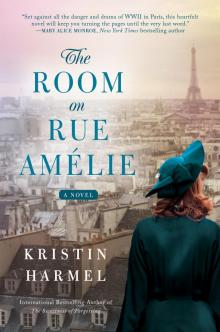 The Room on Rue Amélie
The Room on Rue Amélie The Winemaker's Wife
The Winemaker's Wife The Forest of Vanishing Stars
The Forest of Vanishing Stars The Book of Lost Names
The Book of Lost Names Italian for Beginners
Italian for Beginners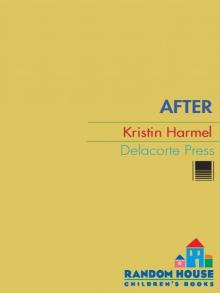 After
After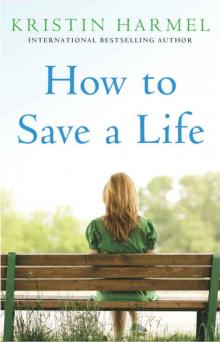 How to Save a Life
How to Save a Life The Blonde Theory
The Blonde Theory The Sweetness of Forgetting
The Sweetness of Forgetting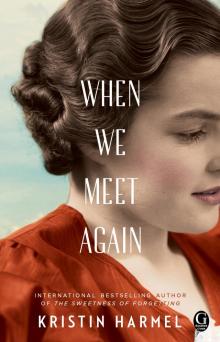 When We Meet Again
When We Meet Again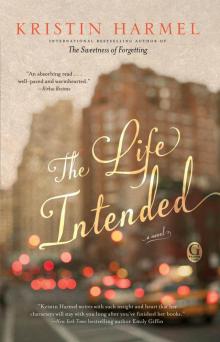 Life Intended (9781476754178)
Life Intended (9781476754178)